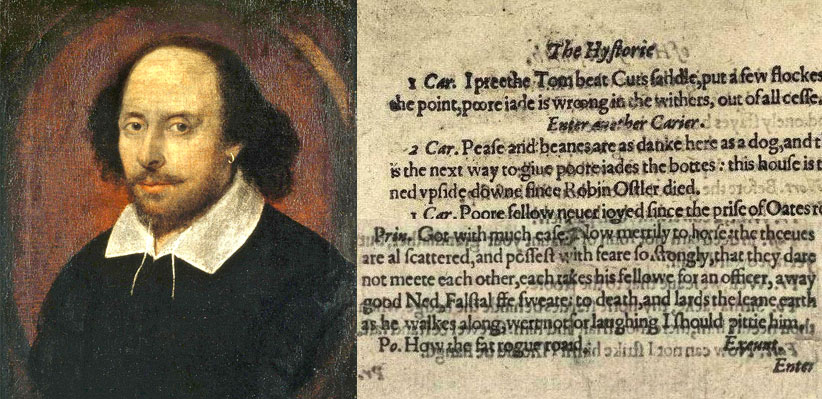 In honor of William Shakespeare we are celebrating the 400th anniversary of his death on April 23, 2016. What better way to do this, than by highlighting the writing done by first-year students in Associate Professor of English John Wesley’s first-year seminar, A Year in the Life of William Shakespeare? This first-year seminar in scholarly inquiry studies four remarkable plays Shakespeare wrote or saw into production in 1599, the same year he opened the Globe Theatre. In the first half of the course, students were introduced to the myriad ways in which Shakespeare’s 1599 plays are shaped by and give shape to the political and cultural intrigues of that year. In the second half of the course, students turned to a play (and year) of their own choosing, the historicist analysis of which is the basis of an independent research project. As part of this project, students were asked to prepare a blog post that reflected on aspects of Shakespeare’s life, a specific work, or a resource or organization associated with Shakespeare, or to provide a personal interpretation of a play. During the month of April, we’ll feature the posts from students that celebrate all things Shakespeare!
In honor of William Shakespeare we are celebrating the 400th anniversary of his death on April 23, 2016. What better way to do this, than by highlighting the writing done by first-year students in Associate Professor of English John Wesley’s first-year seminar, A Year in the Life of William Shakespeare? This first-year seminar in scholarly inquiry studies four remarkable plays Shakespeare wrote or saw into production in 1599, the same year he opened the Globe Theatre. In the first half of the course, students were introduced to the myriad ways in which Shakespeare’s 1599 plays are shaped by and give shape to the political and cultural intrigues of that year. In the second half of the course, students turned to a play (and year) of their own choosing, the historicist analysis of which is the basis of an independent research project. As part of this project, students were asked to prepare a blog post that reflected on aspects of Shakespeare’s life, a specific work, or a resource or organization associated with Shakespeare, or to provide a personal interpretation of a play. During the month of April, we’ll feature the posts from students that celebrate all things Shakespeare!
Congratulations to our wonderful first-year writers. For additional online resources about Shakespeare, check out these sites:
- British Library: http://www.bl.uk/
- Folger Shakespeare Library: http://www.folger.edu/
- Globe Theatre: http://www.shakespearesglobe.com
- Internet Shakespeare Editions: http://internetshakespeare.uvic.ca
- Shakespeare 400: http://www.shakespeare400.org/
The Spark of Creativity
By Megan Biglow
 It’s often thought that no idea is entirely original. Whether you are creating a derivative of another person’s ideas or basing your work off of an admirable example, we are all influenced and inspired to some degree by the work that others do. William Shakespeare was no exception to this phenomenon. Although there is not an overwhelming amount of proof of this, it seems as though Shakespeare was heavily influenced and inspired by Roman and Greek literature and history. This is shown subtly in a vast majority of his work and more transparently in his re-writing of history in plays like Julius Caesar. I assumed that this inspiration was shown in plays involving fantastical and dramatic tales that are set in otherworldly places like The Tempest and A Midsummer Night’s Dream. And how could you not be inspired? From epic tales of heroes fighting off monstrous, deadly creatures, to all-powerful gods, it is nearly impossible to not be struck by the intense imagery and grandiose nature of the tales and epics that originated in Greece. So I was particularly surprised to find that Plutarch’s writings regarding romance and politics inspired Shakespeare heavily. As Plutarch was a Greek man who later became a citizen of Rome, it only makes sense that the political and social savagery that occurred on a regular basis within Rome would have influenced Plutarch’s, and indirectly Shakespeare’s, writings heavily.
It’s often thought that no idea is entirely original. Whether you are creating a derivative of another person’s ideas or basing your work off of an admirable example, we are all influenced and inspired to some degree by the work that others do. William Shakespeare was no exception to this phenomenon. Although there is not an overwhelming amount of proof of this, it seems as though Shakespeare was heavily influenced and inspired by Roman and Greek literature and history. This is shown subtly in a vast majority of his work and more transparently in his re-writing of history in plays like Julius Caesar. I assumed that this inspiration was shown in plays involving fantastical and dramatic tales that are set in otherworldly places like The Tempest and A Midsummer Night’s Dream. And how could you not be inspired? From epic tales of heroes fighting off monstrous, deadly creatures, to all-powerful gods, it is nearly impossible to not be struck by the intense imagery and grandiose nature of the tales and epics that originated in Greece. So I was particularly surprised to find that Plutarch’s writings regarding romance and politics inspired Shakespeare heavily. As Plutarch was a Greek man who later became a citizen of Rome, it only makes sense that the political and social savagery that occurred on a regular basis within Rome would have influenced Plutarch’s, and indirectly Shakespeare’s, writings heavily.
It only makes sense that William Shakespeare would have been so heavily affected by Plutarch’s essays, as they were extremely popular during his time. One author states, “The sixteenth century was indeed steeped in Plutarch. His writings formed an almost inexhaustible storehouse for historian and philosopher alike, and the age was characterized by no diffidence or moderation in borrowing. Plutarch’s aphorisms and his anecdotes meet us at every turn, openly or in disguise” (Brooke “Plutarch’s Influence”) the same of which could be said of Shakespeare in this day and age. As a vast majority of people, including myself, can attest, Shakespeare’s work is studied extensively and is immersed in our culture through language, movies and art of all kinds. The very words he wrote permeate our speech and writing today, just as Plutarch would have for the people of the 16th century. That being said, it would only make sense that Shakespeare would be heavily affected, or at the very least, interested in the work of a man that was so prevalent and influential in his time.
The fact that an excellent author was inspired by a brilliant mind, aside from his own, is a prime example of the necessity for education and appreciation of exceptional literature. Had William Shakespeare not become so well versed in Plutarch’s essays, it is entirely possible that he would not have been as prestigious and exemplary as he was in his time and in present day. And personally, I would think that life would be boring without writers that can give us an entertaining and fascinating escape from our daily lives from time to time. It is deeply important to understand the plays, essays and writers from the past so that we too can be inspired to create excellent, immersive and cerebral.
Bibliography
Walbank, Frank W. X66541-004-582E8B66.jpg.pagespeed.ic.zSskYXxY3u. Digital image. Encyclopedia Britannica. The Editors of Encyclopædia Britannica, n.d. Web. 11 Nov. 2015.
Plutarch. Plutarch’s Shakespeare. Ed. C.F. Tucker Brooke. London: Chatto and Windus, 1909. Shakespeare Online. 20 Feb. 2010. (2/27/16) <http://www.shakespeare-online.com/essays/plutarchshakespeare.html >.
Wyndham, George. North’s Plutarch. From Essays in romantic literature. London: Macmillan and Company, 1919. Shakespeare Online. 20 Feb. 2010. (2/25/16) <http://www.shakespeare-online.com/essays/northshakespeare.html >.
